
This is the PowerPoint and lesson plan associated with the lesson 8 Tribes, 1 State.
- Subject:
- Arts Education
- Social Studies
- Visual Arts
- Material Type:
- Presentation
- Provider:
- Carolina K12
- Author:
- Carolina K12
- Date Added:
- 05/12/2021

This is the PowerPoint and lesson plan associated with the lesson 8 Tribes, 1 State.

Students will research an African American person based on set questions. The students will present their person in a digital presentation format.
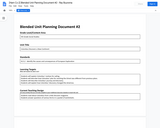
Columbus has an idea, a plan, and an amazing accident!

Students watch video clips (individually or as a class) and answer questions to show understanding of each video: Cornelius Vanderbilt, Transcontinental Railroads, Captains of Industry and Robber Barons.
The end activity is a 3-2-1 triangle activity where students are asked to summarize what they have learned and decide if they think Vanderbilt was a Captain of Industry or Robber Baron.
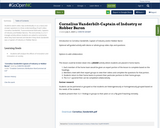
Students watch video clips (individually or as a class) and answer questions to show understanding of each video: Cornelius Vanderbilt, Transcontinental Railroads, Captains of Industry and Robber Barons.
The end activity is a 3-2-1 triangle activity where students are asked to summarize what they have learned and decide if they think Vanderbilt was a Captain of Industry or Robber Baron.

In this lesson, students will define propaganda and study the various types of propaganda techniques. After viewing an assortment of World War II propaganda across different mediums (posters and videos), students will create a piece of World War II propaganda. There is also an optional viewing guide for the Nazi propaganda film, "Triumph of the Will."

In this lesson, students will learn about the work of Eleanor Roosevelt and read letters written to her by children living during the Great Depression. Students will apply their acquired knowledge creatively by assuming the role of Eleanor Roosevelt and responding to a letter of their choice.
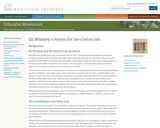
This resource provides background information on Eli Whitney and explains how and why he created the cotton gin.

In this lesson, students explore major events occurring at the end of World War II, including the bombing of Pearl Harbor, the forced relocation of Japanese Americans into internment camps, and America’s use of atomic weapons against Hiroshima and Nagasaki. Students will explore primary sources, read poetry and a narrative, and discuss the US government’s choices in depth while examining the affect on America, Japan, and the world community at large.
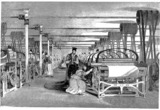
After studying elements of the Industrial Revolution, students will conduct an independent or collaborative research assignment related to the Industrial Revolution.

After studying elements of the Industrial Revolution, students will conduct a collaborative research assignment related to the Industrial Revolution.
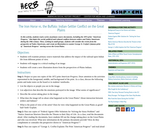
In this activity, students read a series of primary source documents, including the 1872 print "American Progress," that depict the social, political and cultural conflicts between settlers and Native Americans during the 19th century. Then, working in small groups, students will consider the events from the perspective of Native Americans, and create an illustration to counter George A. Crofutt's famous print of "American Progress" moving across the Great Plains.
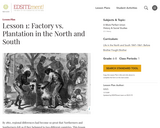
This lesson focuses on the shift toward mass production in northern factories and on southern plantations that occurred during the first half of the 19th century. Using an economics-focused approach to examining U.S. history prior to the civil war, students examine the role of slavery, industrialization, regionalism, and political responses that ultimately led to the start of a war.
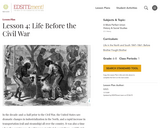
Students demonstrate their knowledge of life before the Civil War, with an emphasis on differences between the North and South.
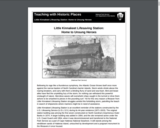
Little Kinnakeet Lifesaving Station is an excellent reminder of the stations constructed by the U.S. Lifesaving Service (U.S.L.S.S.) during its 44-year existence (1871-1915). The original station building was among the first seven constructed on North Carolina's treacherous Outer Banks in 1874. Use this lesson plan to learn more about Little Kinnakeet Lifesaving Station.
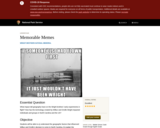
Essential Question
What impact did geography have on the Wright brothers’ early experiments in flight? How has the technology created by Wilbur and Orville Wright impacted individuals and groups in North Carolina and the US?
Objective
Students will be able to a) understand the geographic factors that influenced Wilbur and Orville’s decision to come to North Carolina, b) explain the changes brought about by the Wright brothers’ invention, and c) create an original work to communicate ideas and feelings.

Students will explore the various nicknames that North Carolina has been given throughout history, focusing on the nickname given to it during the early 1800s: the Rip Van Winkle state. Students will listen to the legend of Rip Van Winkle and then discuss the story.

Students will learn about the North Carolina Fund, a series of experimental programs developed by Governor Sanford's administration to address these challenges. Students will explore the North Carolina's Fund's components and its challenges and successes within the context of segregation and the fight for civil rights.

Students are introduced to the costs and benefits of credit. It explains credit terms and the "Three C's of Credit" that lenders use to qualify consumers for loans. Learning about the CARD Act will help students understand the financial details involved in using credit, as well as their rights as consumers. The assessment asks students to write tips for the wise use of credit, which should help them in developing better financial decision-making.
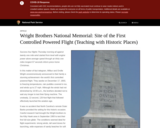
Topics: This lesson could be used in American history, social studies, and geography courses in units on technological and scientific advances at the turn of the 20th century, aviation history, or great inventors. It also could be used in a unit commemorating the anniversary of the Wright brothers' first flight on December 17, 1903.
Time period: Early 20th century
Objectives for students
1) To describe the status of human flight experiments at the turn of the 20th century.
2) To determine why the Wright brothers chose the Outer Banks of North Carolina to conduct their flight experiments and how conditions in this region impacted their efforts.
3) To describe the challenges faced by the Wright brothers during their flight experiments and how they overcame them to achieve controlled powered flight on December 17, 1903.
4) To examine how the Wright brothers' historic accomplishments at Kill Devil Hills, North Carolina have been commemorated.
5) To research efforts to commemorate important people and events in their own community.